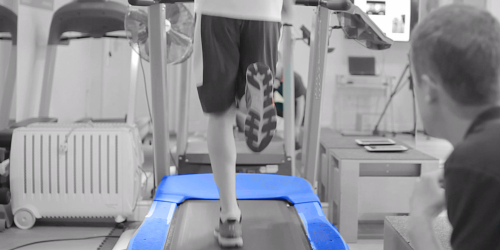Synergy Physio is a leading physiotherapy clinic in the UK. Our integrated and innovative approach to injury management is focused on providing quality outcomes tailored to your needs.
One of the common issues we deal with is the care and treatment of the Calf Muscle Tear injury. A torn calf muscle is similar to an Achilles tendon tear,but occurs higher up in the back of the leg. You may feel that you've just been hit in the lower leg and potentially hear a "pop." There is a sudden pain in the back of the calf. Then you mayexperience swelling or bruising in the calf muscle, and you’ll have difficulty walking properly or standing on your toes.
The condition comes in three stages depending on the severity. At Synergy, we use a unique rehabilitation approach which incorporates recovery from the moment you walk in to see usto make sure you not only fully recover but also get back to your best level. This involves treating the initial symptoms, working to regain the strength in your calf and finally to ensure that your running technique is improved to reduce stress and risk of re-injury. We are focused on getting you moving as early as possible to facilitate a smooth and prompt return to your chosen sporting activity.
click here to book a free online consultation
Calf muscle tear symptoms
Symptoms of a calf strain can vary significantly but usually involve a sudden sharp pain at the back of the lower leg. The calf muscle will often be tender to touch at the point of injury and swelling, and bruising may appear within hours or days.
Depending on how bad the calf injury is, the individual may be able to continue exercising although he/she will often have some discomfort/tightness during or after the session. When injuries are more severe, the athlete may be unable to walk due to severe pain.
A calf muscle tear is graded from 1 to 3, with grade 3 being the most severe. A grade 1 will not usually need professional treatment whereas grade 2 or 3 injuries, depending on their severity, may require more specialist treatment and rehabilitation advice from a sports injury professional.
Calf muscle treatment
Treating a Calf Muscle Tear is done in stages by through the guidance of the experienced Physiotherapists and Rehabilitation Specialists at the Synergy Physio clinics. We will get you back in shape within the shortest period possible.
These stages involve:
The medical professional may prescribe anti-inflammatory medication e.g. ibuprofen which is beneficial in the first few days after the injury. Do not take ibuprofen if you have asthma and always speak to a pharmacist or doctor before taking medications. There is some evidence that anti-inflammatories can impair healing so do not take them for more than a few days at the beginning of the injury.
Electrotherapy such as ultrasound may be applied. This transmits high-frequency sound waves into the tissues, which in the early stages can help with pain relief and reduce swelling. In the later stages of rehabilitation, the ultrasound waves cause a micro-massaging effect which can help stimulate blood flow into the muscle.
Sports massage of calf muscles can be applied after the initial acute phase has finished (Warning: do not massage in at least the first two/three days post injury as this may increase bleeding in the area). The benefits of massage are stimulating blood flow, micro-stretching the muscle and releasing areas of spasm (removing muscle knots) in the muscle. The other major benefit of massage in the latter stages of a calf strain recovery is to soften the newly formed scar tissue and help to align the newly laid fibers to encourage more effective muscle healing and prevent re-injury.
If you seek a sports injury professional's opinion, he/she will carry out a full assessment of your injury and make an accurate diagnosis. Then, if required, they will then treat the injury and prescribe and progress a full calf strain rehabilitation program which can include a number of stretching and strengthening exercises.
Once the initial healing of the muscle has taken place, it is essential that the calf muscles are adequately strengthened to reduce the likelihood that the injury will reoccur or have an adverse effect on future performances.
The importance of having the calf muscle tear injury treated by a professional therapist is that as well as being very disabling, the calf muscle strain or tear will usually be accompanied by excessive bruising right down the back of the calf, sometimes leaving the whole foot black and blue for a week or more. Any stretch of the calf muscle such as the normal heel to toe gait during walking will cause pain during the healing phase, so the afflicted will usually limp for two weeks or more. Therefore, seeking professional help especially for athletes is a good idea to speed up the recovery as well as ensuring the injury does not reoccur.
Synergy Physio includes highly specialised clinicians who have worked in professional sport and experienced in assessing and treating a wide range of sporting injuries at a variety of different sporting levels. A combination of hands-on physiotherapy, biomechanical analysis, movement based gym exercise will take you to the optimum level and prevent any future recurrence of injuries.
For further inquiries and bookings visit our website http://www.synergyphysio.co.uk/book-now/.
You can also click here to book a free online consultation with an experienced physiotherapist.





